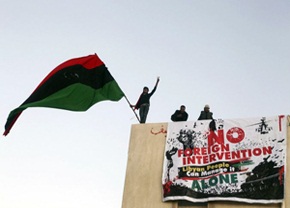Say No to Libyan Interventionby Llewellyn H. Rockwell Jr.Mar. 18, 2011 |
Popular 
Rep. Thomas Massie Warns Congress is Trying to Pass Hate Speech Laws to Outlaw Criticism of Israel

ADL Urged Congress to Pass FISA Law Spying on Americans to 'Protect Israel'

'Sniper Seen on Roof Overlooking Pro-Palestine Protest' at Indiana University

Claim Jewish Student Was 'Stabbed In The Eye' by Pro-Palestine Protester Draws Mockery After Video Released

Axios Poll: Majority of Americans Now Want Mass Deportations
  Following the US-lobbied UN authorization of military death dealing in Libya, the murderous regime of Colonel Gaddafi said immediately that it would stop all killing. That put Obama's war on hold, for now. It seems that the crazy colonel has learned a thing or two about American foreign policy. If you pretend to favor the stated goals of the empire and comply with its stated dictates, you can otherwise do what every government in the world is structured to do: stay in power at all costs. Following the US-lobbied UN authorization of military death dealing in Libya, the murderous regime of Colonel Gaddafi said immediately that it would stop all killing. That put Obama's war on hold, for now. It seems that the crazy colonel has learned a thing or two about American foreign policy. If you pretend to favor the stated goals of the empire and comply with its stated dictates, you can otherwise do what every government in the world is structured to do: stay in power at all costs.Gaddafi learned this lesson about a decade ago, when, with much fanfare, he announced that he would stop his nuclear weapons program and join the war on terror. The United States then decided to rank him and his regime among the world's good guys and proceeded to hold him up as an example of wise statesmanship. Then he proceeded to dig in more deeply and tighten his despotic control over his citizens, all with the implied blessing of the United States. For weeks, American officials have been decrying Gaddafi's bloody attacks on his people, but does the United States really have a problem with dictatorship of his sort? This fact is unknown to Americans, but in the Middle East, and in Arab nations in particular, American commercial interests are regarded as a force for liberation, but not the US government. The United States has been the key to the power of Middle East dictatorships for decades, among which are Saudi Arabia, Jordan, and Yemen. So it is something of a joke that the United States would push a war against Libya in order to save that country from dictatorship. More likely, the real issue here is the same one that inspired the wars against Iraq: the ownership and control of the oil. And even if freedom were the driving motivation, when in modern history has war ever actually brought that to people? All war by nation-states today ends in massive civilian deaths, destruction of infrastructure, political upheaval without end (see Afghanistan and Iraq), vast expense, and bitterness all around. War will not achieve its claimed objective. It might even end up entrenching Gaddafi's power. But let's say that he, like Saddam Hussein, ends up dead. What then? The new government will be handpicked by the victor, and never gain any credibility, just as in Iraq. People resent foreign conquerors even more than local despots, and this resentment is not a good foundation for a future of liberty. President Obama probably looks at the prospect of war rather lustily, just as Bush, Clinton, Bush, Reagan, et al. did before him. But this time, there is a problem. The United States simply cannot afford to be seen as attacking yet another Muslim country (though that is what it is doing) at a time when all the world knows that US foreign policy is primarily based on whipping up anti-Islamic feelings the world over, and taking over the oil. For this reason, the Obama administration must seek the cover of the United Nations and the cooperation of other Arab states. England and France have been reliable, but not Germany and not other Arab states, so the operation could end up more tricky than the president initially supposed. Let's just pretend for a moment that the US government really does want to free the people of Libya from a wicked man. What is the right way to go about it? There is the assassination option, which I oppose but which would nonetheless be a much better choice than war. What of the United States' legendary CIA hit men that can take down anyone on the planet following a few orders from on high? Where are they now? Recall that in the last days before the last war on Iraq, a spokesman for Saddam actually did propose a duel between Bush or Cheney and Saddam or his vice president. It was not an unserious suggestion. This would have been a much better option for both Iraq and America, but then the government doesn't really get what it wants out of war, which is a chance to blow things up, spend gobs of money, whip up the population in war frenzy, and inspire another bout of nationalistic frenzy to help consolidate power for the war-making regime. Is it possible to both oppose Gaddafi and oppose a war on Gaddafi? Absolutely. This is a position that all Americans should adopt. In the same way, it is possible to oppose the Obama administration but also oppose having a foreign army oust him in order to liberate us. In the early days of the protests in Libya against Gaddafi, the protesters held up signs opposing any foreign intervention. This is still the right approach. There should be no war, no blockades, no impositions of a "no-fly zone," or anything else. The United States has been a supporter and backer of Gaddafi for a decade. That damage is already done. Going to war would only compound it. For the sake of freedom and human rights, we must say no to war. We must also say no to all forms of foreign intervention that support dictatorships until they become too politically embarrassing to Washington, DC. __ Llewellyn H. Rockwell Jr. is chairman of the Ludwig von Mises Institute in Auburn, Alabama, editor of LewRockwell.com, and author of The Left, the Right, and the State. Send him mail. See Llewellyn H. Rockwell Jr.'s article archives. |



